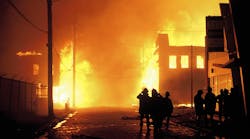A study released in August found that people directly exposed to the 2001 World Trade Center disaster were four times more likely than others to report post-traumatic stress symptoms in 2006-2007. In addition, 10 percent of the study participants had been newly diagnosed with asthma. Of all study participants, rescue and recovery workers had the highest rate (12 percent) of new asthma, and their risk doubled if they arrived at the WTC site on 9/11 or worked longer than 90 days.
The full report suggests that post-traumatic stress symptoms and asthma are the major health ramifications of the World Trade Center attack.
Numerous responders have also since been affected with other illnesses and cancers, some fatal, and have called upon city, state and federal officials for recognition and compensation.
The New York City Health Department acknowledges on its 9/11 Health website that, "While the full scope of 9/11-related problems is unknown, a growing body of evidence suggests that significant health conditions have emerged that are associated with the disaster, in particular for those exposed during the collapse of the towers and those who participated substantially in rescue, recovery, and clean-up operations."
However, the department also states that additional study is required to determine links between these cases and the 9/11 response.
A number of developments have been underway in the past year to address the needs of those affected, including the addition of $70 million in new 9/11 health funding in President Obama's proposed budget for fiscal year 2010, as well as the re-instatement of "9/11 Health Czar" Dr. John Howard to the Department of Health and Human Services.
In addition, legislation was proposed this year for the 9/11 Health and Compensation Act, to provide permanent long-term federal funding to monitor and treat those affected by 9/11. The bill (H.R. 847) was introduced early this year and the Senate companion bill (S. 1334) was introduced July 24. The bill would also reopen the 9/11 Victim Compensation Fund to provide compensation for economic losses and harm.
The bill is also known as the James Zadroga 9/11 Health Compensation Act, named after New York Police Detective and 9/11 responder James Zadroga, whose death was among the first attributed to exposure to the toxins of Ground Zero.
Also this summer, the New York City Council held a hearing on line-of-duty benefits for World Trade Center-related conditions. "Introduction No. 714" would create a presumption of line-of-duty benefits for these conditions as covered by the New York State pension law. The bill would eliminate medical judgment from a broad class of pension decisions.
For updates on these efforts and further information on 9/11 health issues visit the NYC Health Department's 9/11 Health website.
Related Links:





